Most people make dozens of movements in their sleep each night. They turn from side to side, from belly to back. They move an arm, reposition a leg. They scratch. They adjust the blankets, flip their pillow.
Akhil Jhaveri sleeps in four or five different, predetermined positions. He can’t shift his body if he’s suddenly uncomfortable. He can’t fluff his pillow if it goes flat. Amyotrophic lateral sclerosis has robbed him of a normal night’s sleep.
Instead, Akhil has to wait until an alarm goes off, alerting his caregiver to move him. If he must be moved before the set time, he has to make enough noise to awaken his caregiver — a difficult feat when he’s wearing a ventilation mask that forces oxygen into his lungs — and then try to muster the energy to explain what he needs.
“I need a lot of adjustments to get comfortable,” Akhil explained in a recent post on his blog, Me and ALS.
My skin crawls at night which makes me feel itchy and, of course, I cannot scratch. Akhil Jhaveri
“My skin crawls at night which makes me feel itchy and, of course, I cannot scratch,” he wrote. “I have to prioritize my needs so I do not annoy the person caring for me with endless demands. I have found that if I focus on positive things about my life, it helps distract me from my needs. Laura says it is similar to using Lamaze breathing during childbirth — it takes your mind off the pain but it is still there.”
“The only difference is I am ‘giving birth’ every night.”
As ALS slowly stole Akhil’s ability to move his feet and legs, then his arms and hands, he’s had to rely on others to perform the hundreds of movements, large and small, that most people do unconsciously each day.
Akhil controls only his thoughts.
“Meditation is very necessary for anyone suffering with a disease like mine,” he said. “When you can’t move, all you’re left with is your mind. You have to calm the mind. Meditation is my way to conquer the demons.”
Most nights, Akhil thinks about what he would be doing if he didn’t have ALS. He thinks about the vacations he and his family would take to the Mediterranean, or to Egypt to see the pyramids.
Akhil also meditates on God’s word. Years ago, Akhil watched a movie about U.S. prisoners of war and their brutal treatment during the Vietnam War. One said the only thing that kept him going was repeating God’s word.
Akhil finds comfort in God’s word, too.
“This is a shadow of death, but it’s not death itself,” Akhil said. “It’s really neat when you realize you’re just in the shadow. When the sun comes out, the shadow disappears.
“So I just wait.”
Arduous routine
When Akhil’s physical health began to decline several years ago, his wife, Laura, served as his primary caregiver. But as his mobility became more limited and his need for assistance with daily activities grew, the family decided to hire a caregiver. Laura still cares for her husband on the weekends.
Akhil’s current caregiver, 23-year-old Russell Warner, has been with the Ridgefield family for two years.
“It’s like getting married to someone who has a terminal illness,” Warner said. “I’m with him 19 hours a day, five days a week.”
Most of Akhil’s days begin between 9 and 10 a.m. Russell repositions Akhil from his side to his back. He raises the bed into a sitting position and slips Akhil’s glasses on. Akhil sits quietly as Russell prepares his breakfast.
As Akhil’s muscles deteriorated, he lost the ability to eat solid food. Now, Akhil gets nutrients from liquid formula. Russell fills a measuring cup with the milky liquid, then pours the formula into a syringe. The fluid slowly drains from the syringe, through a port and into Akhil’s stomach.
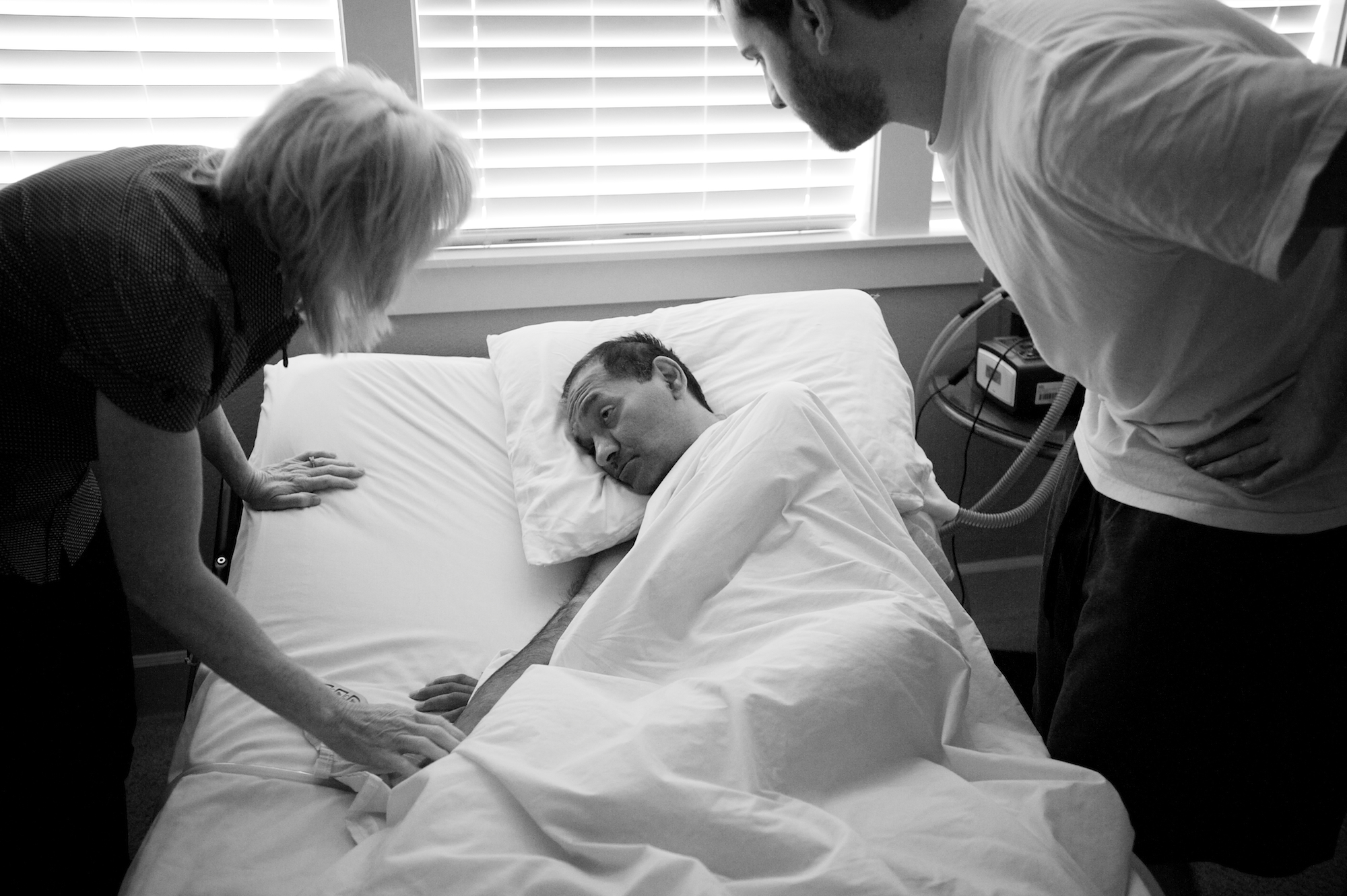
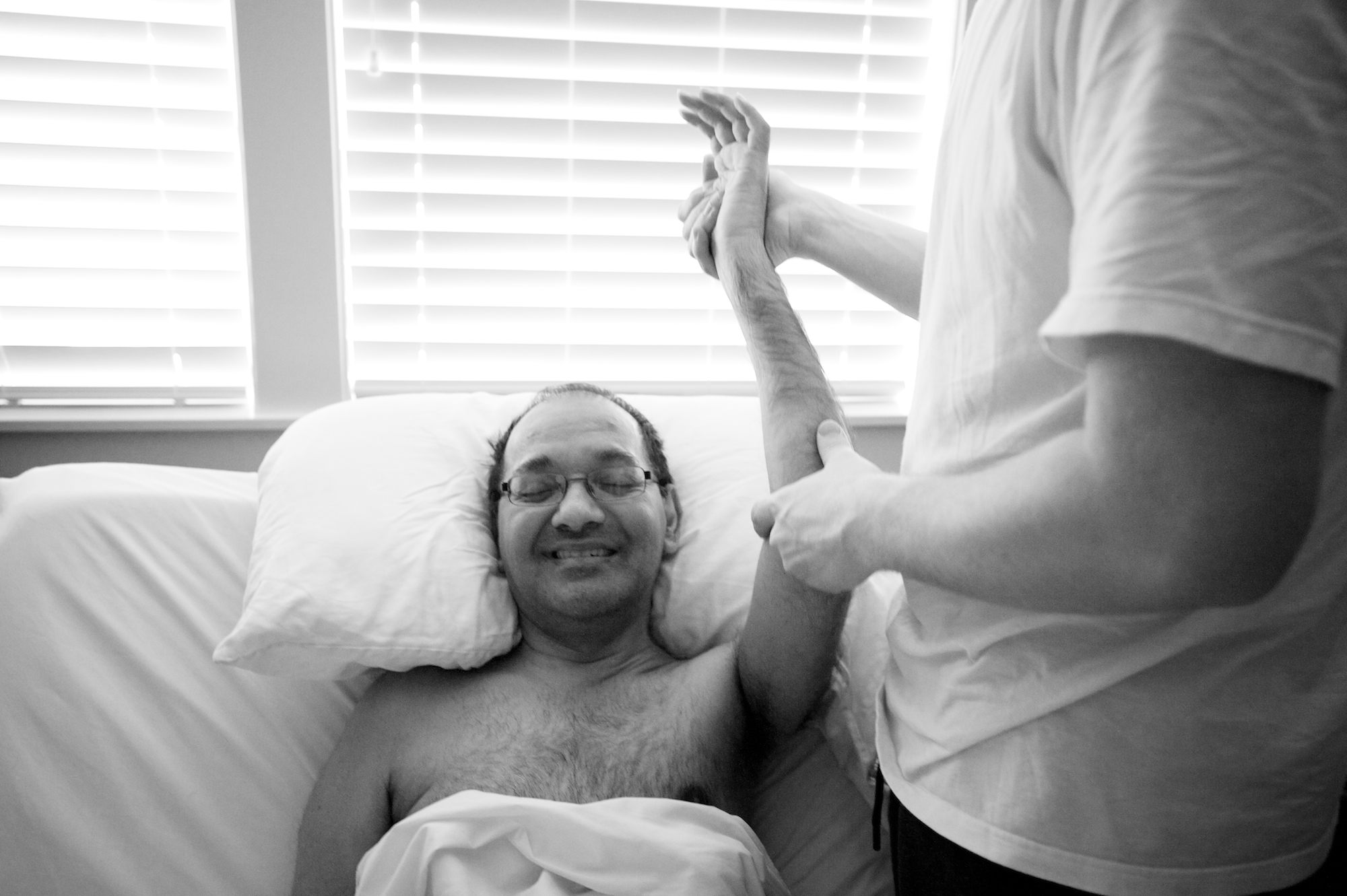
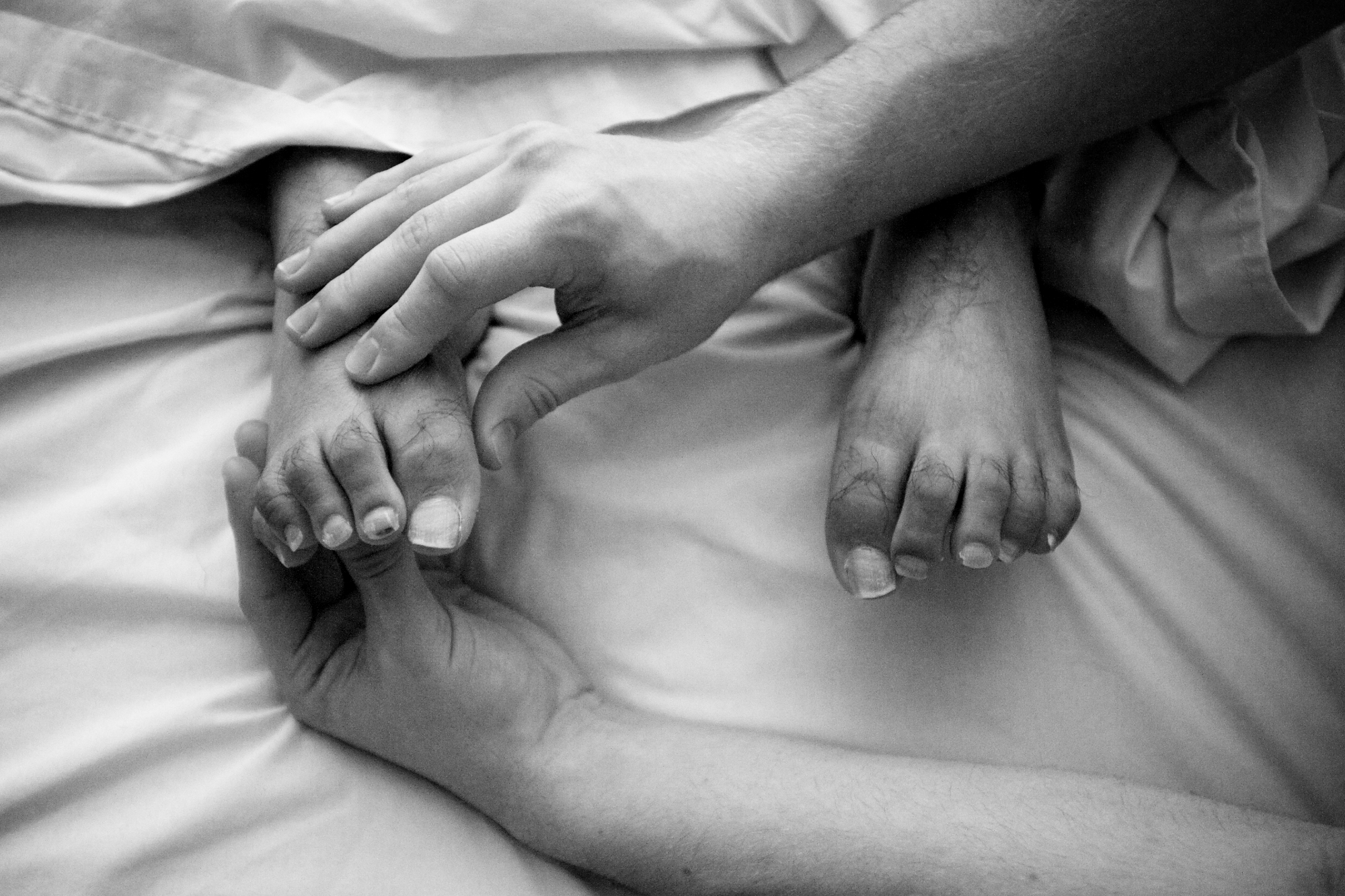
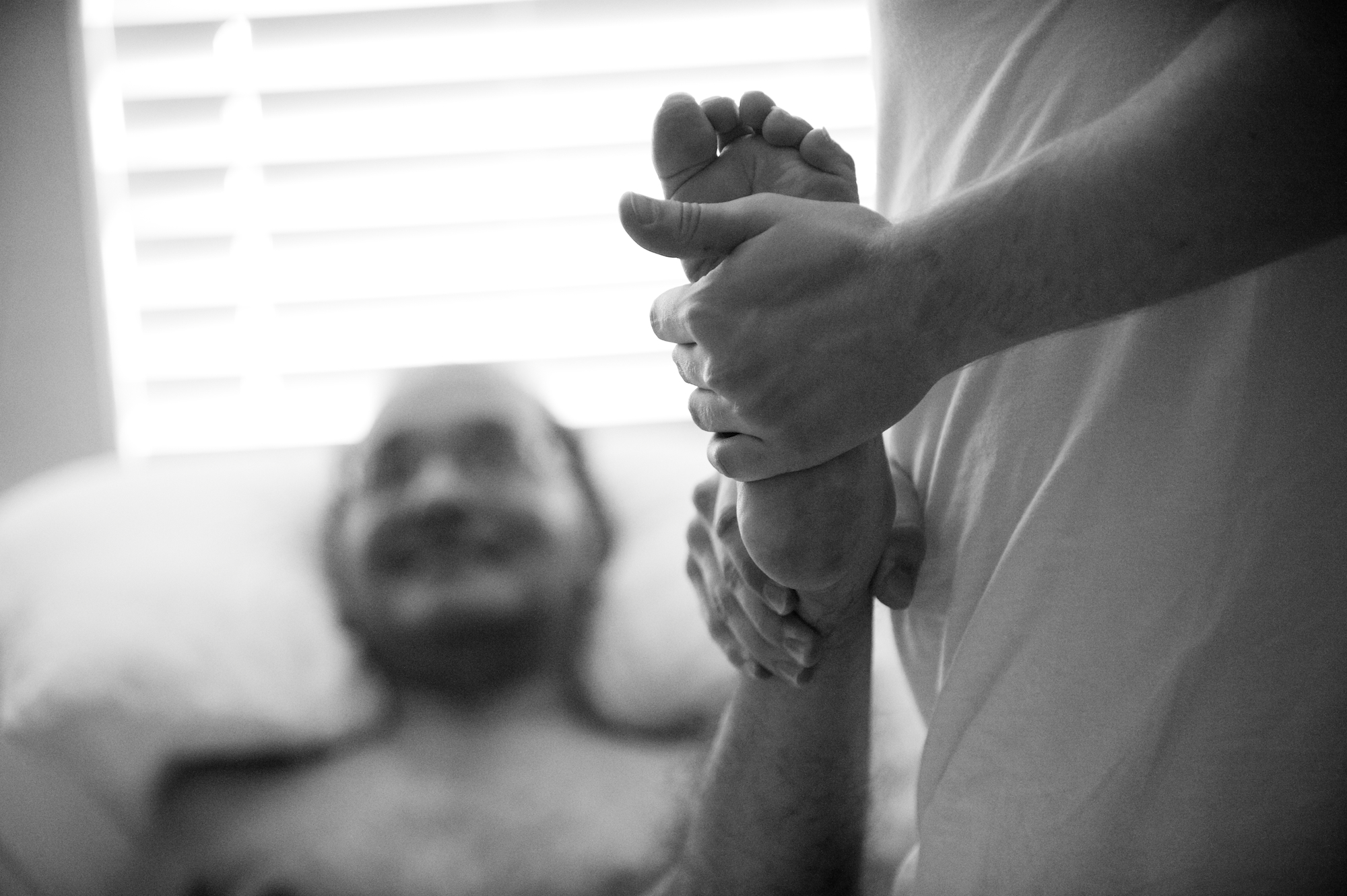
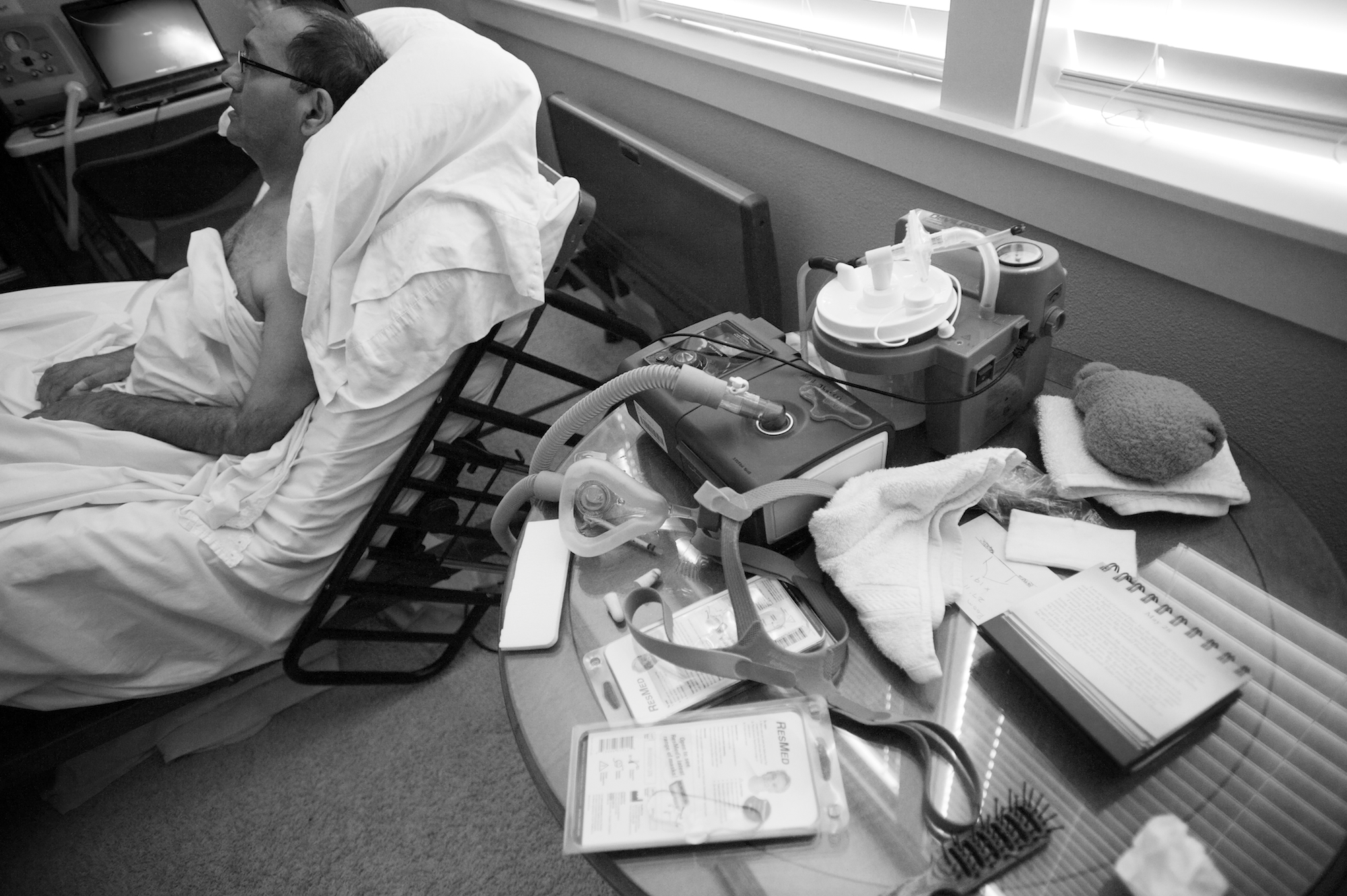
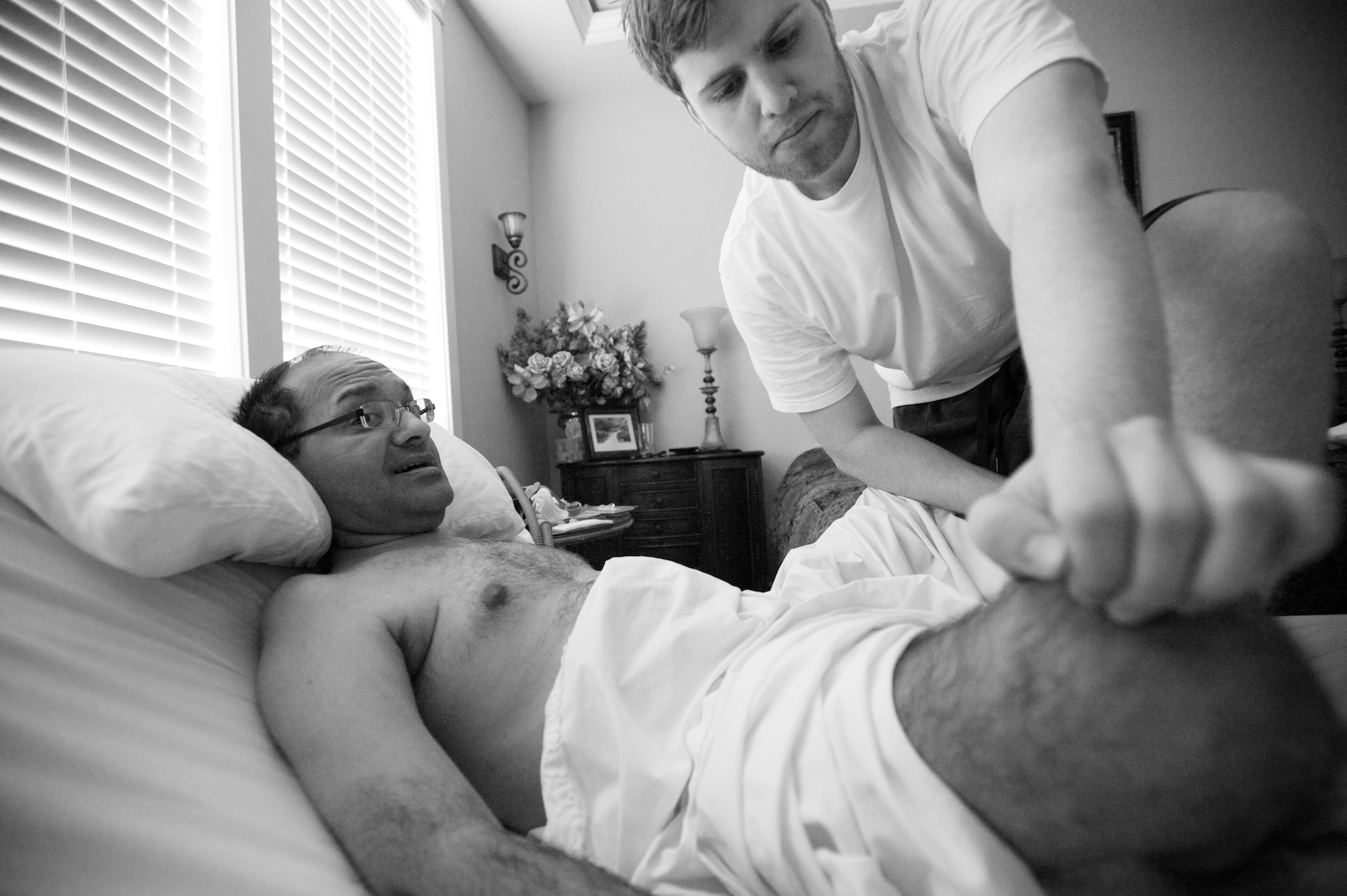
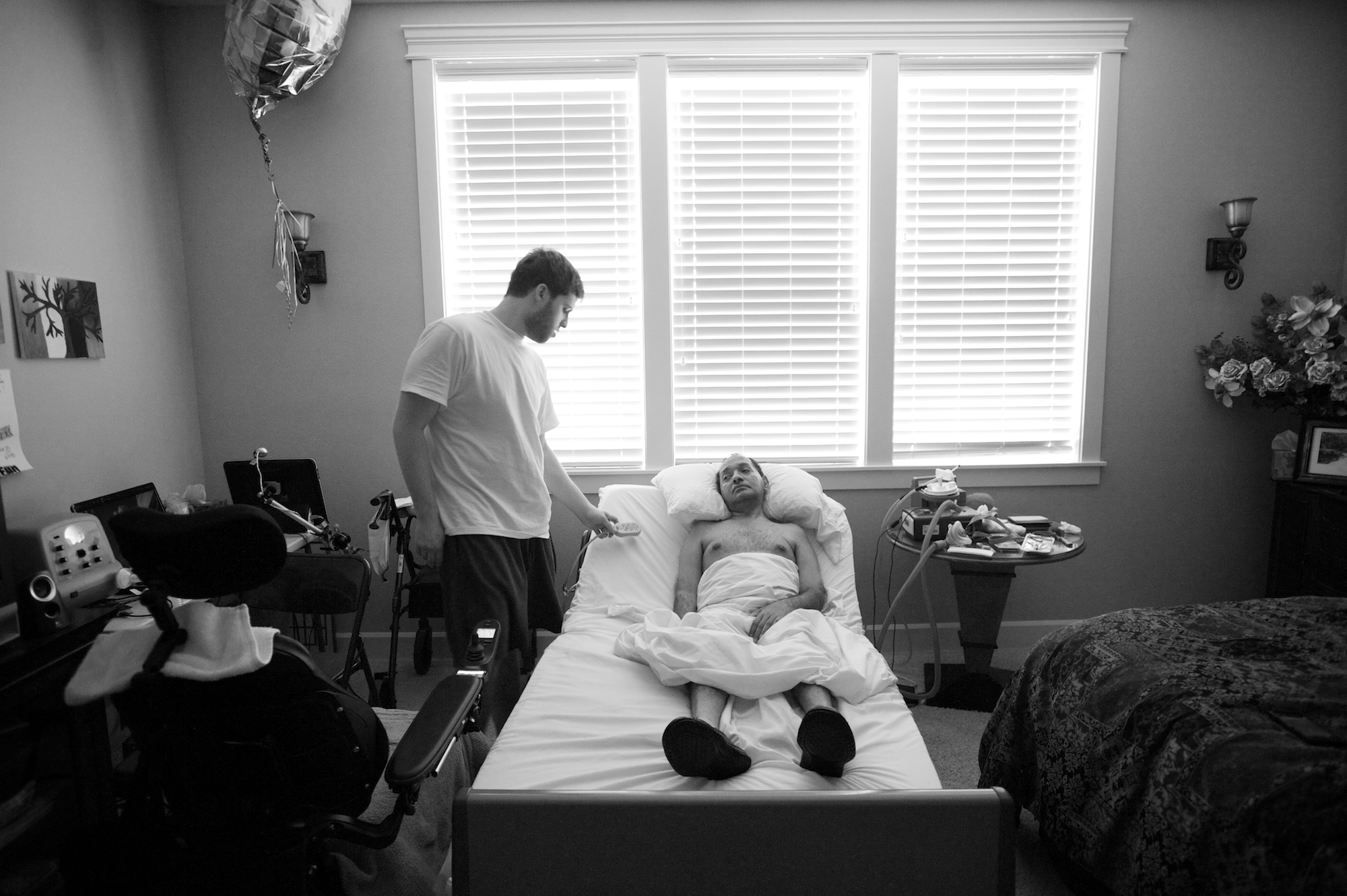
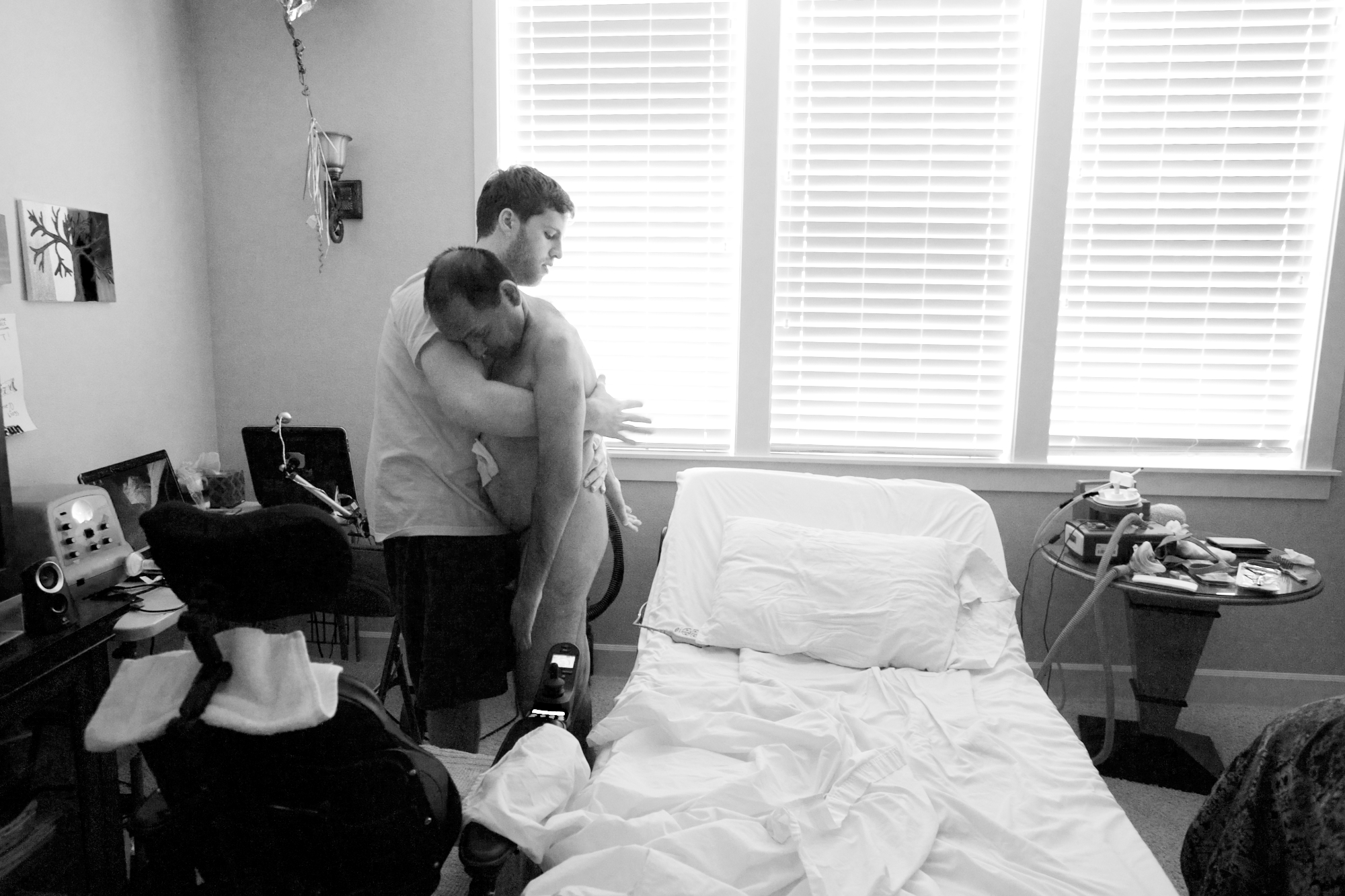
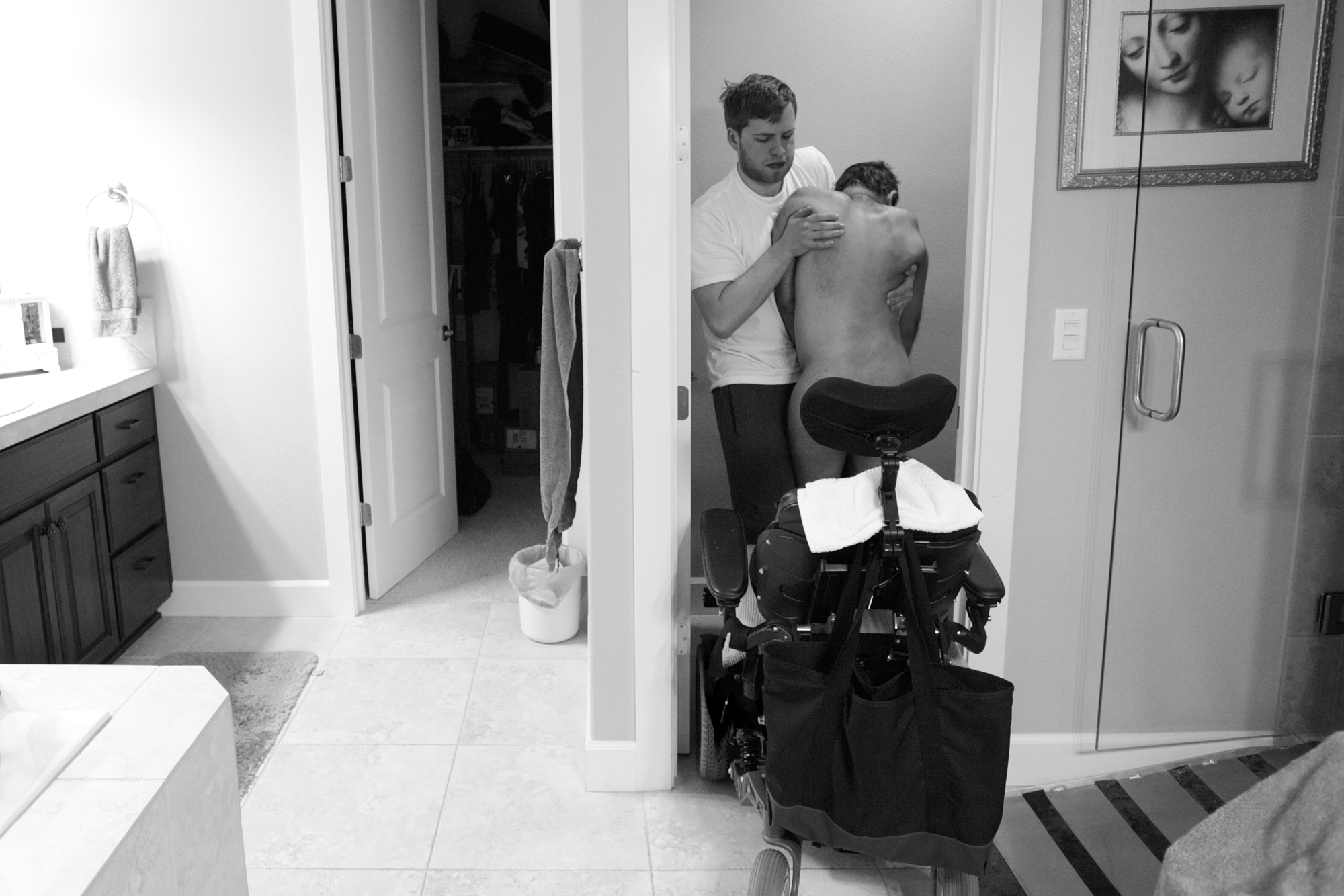
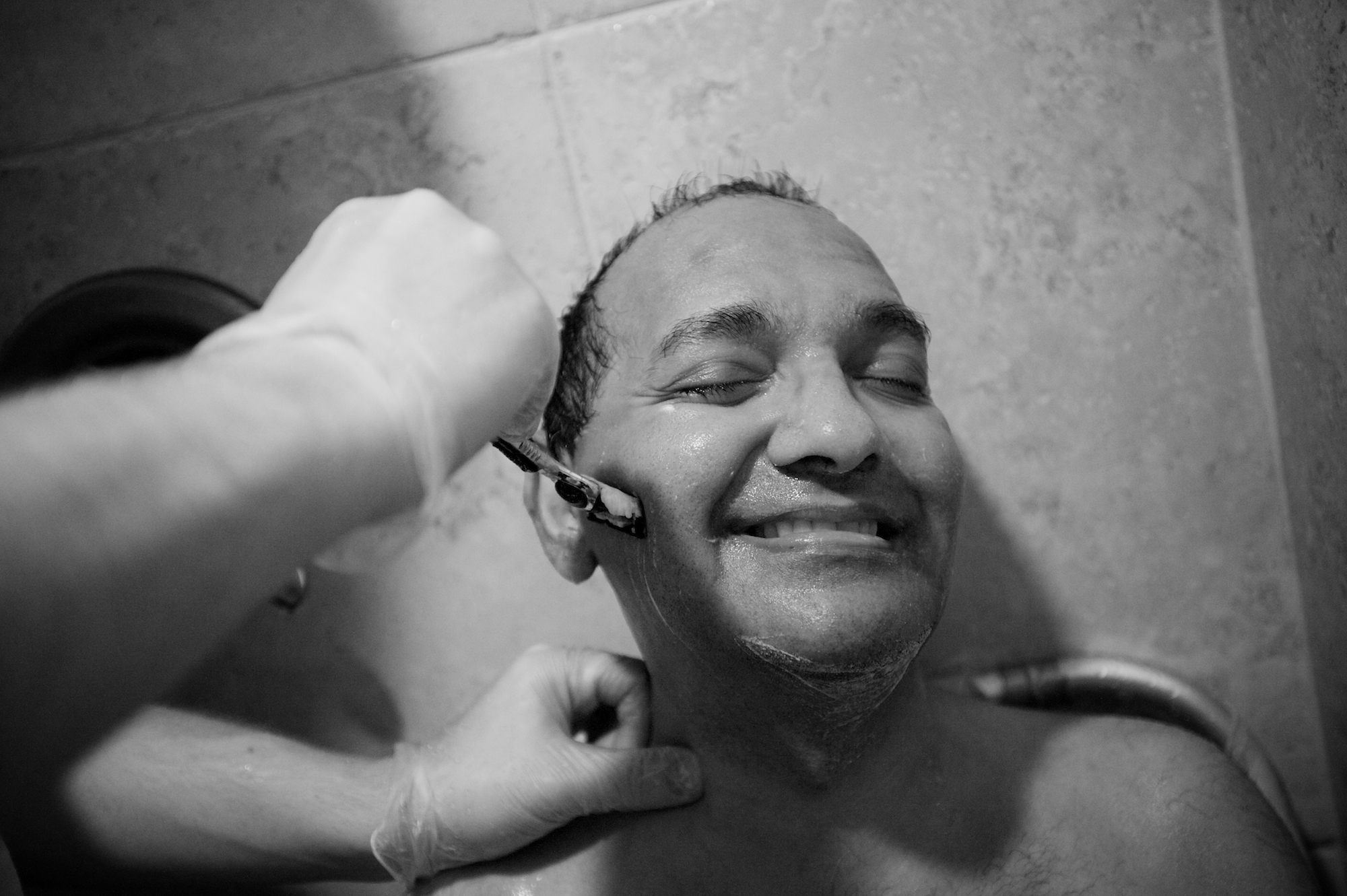
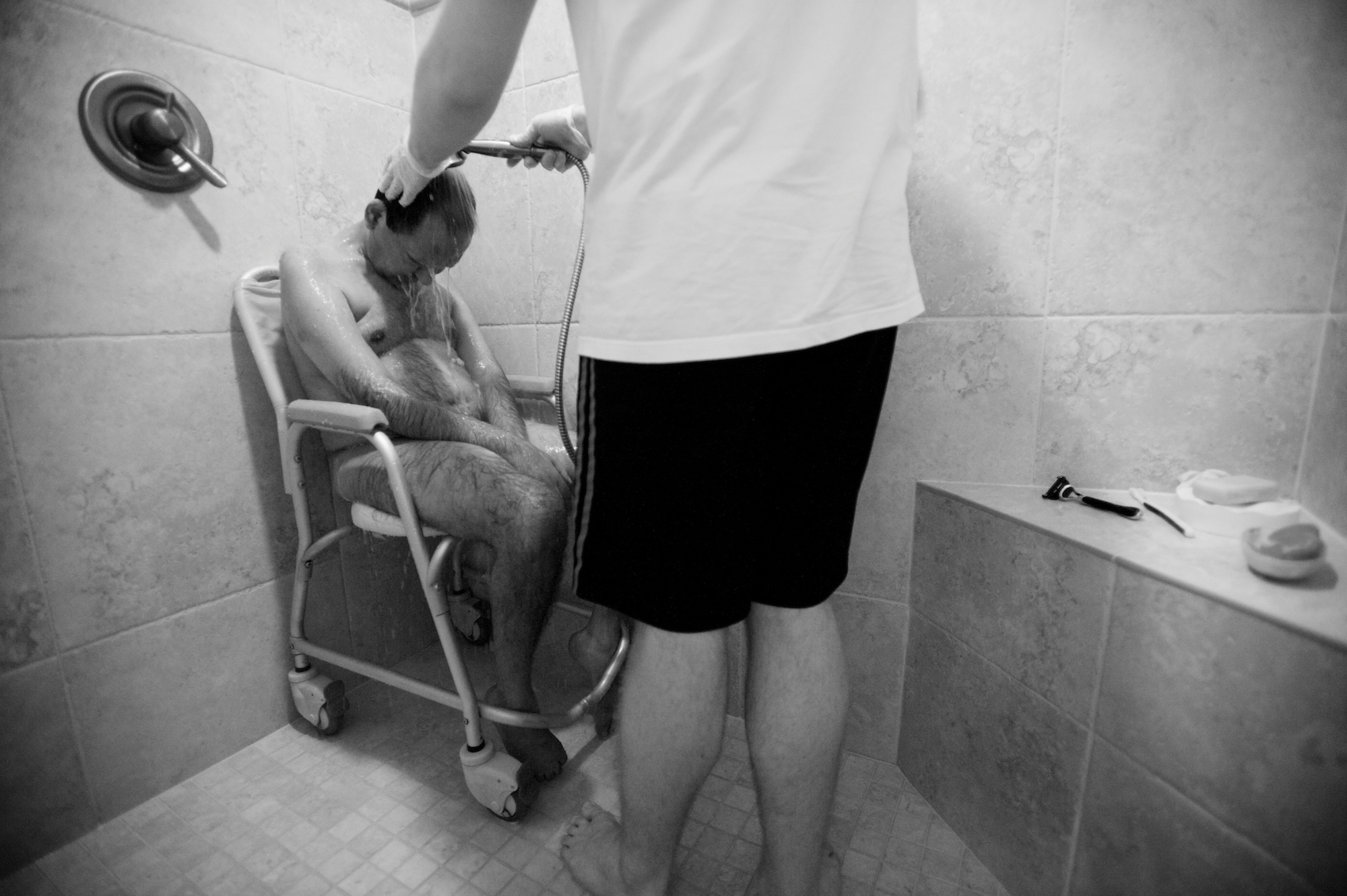
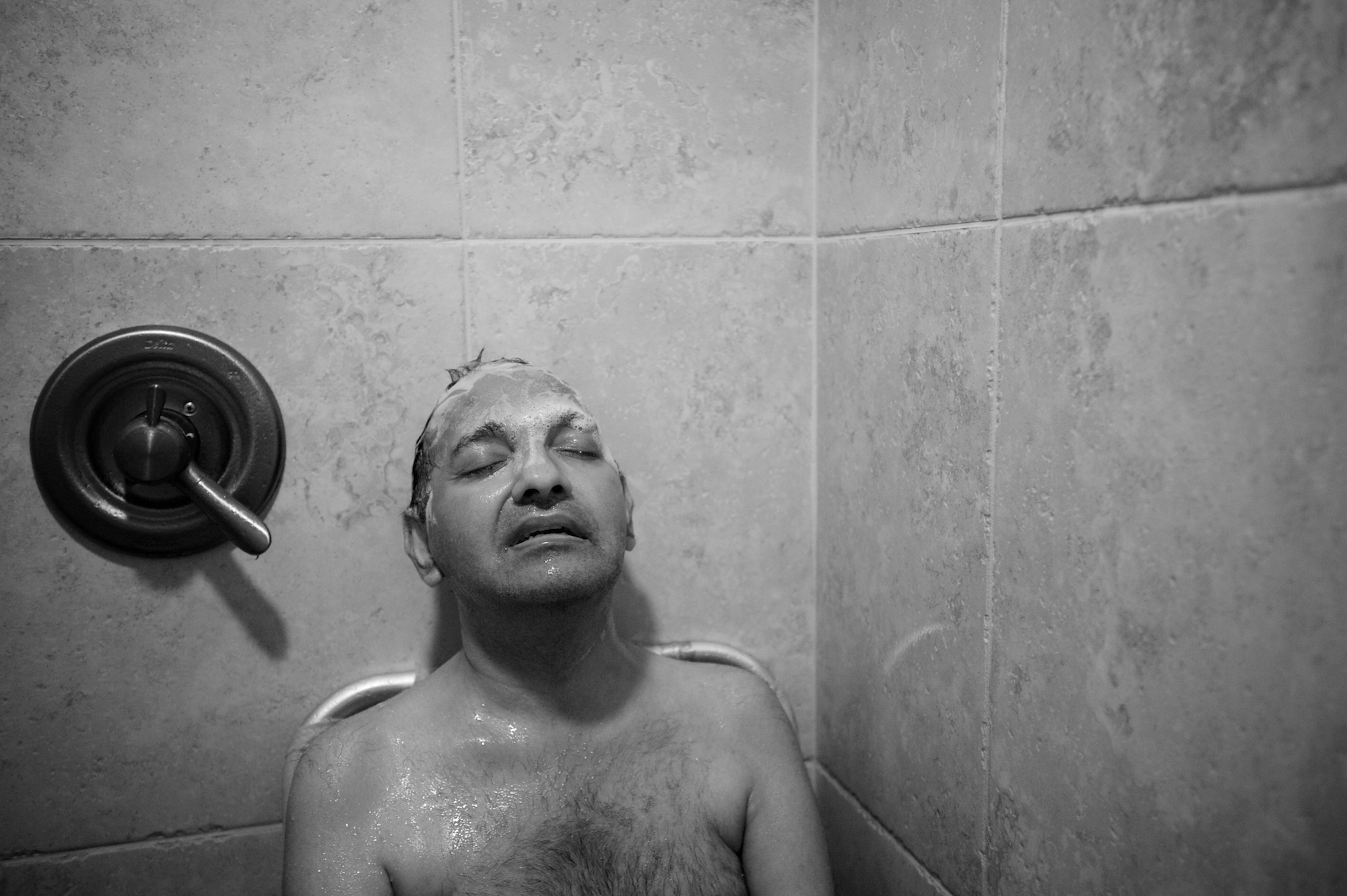
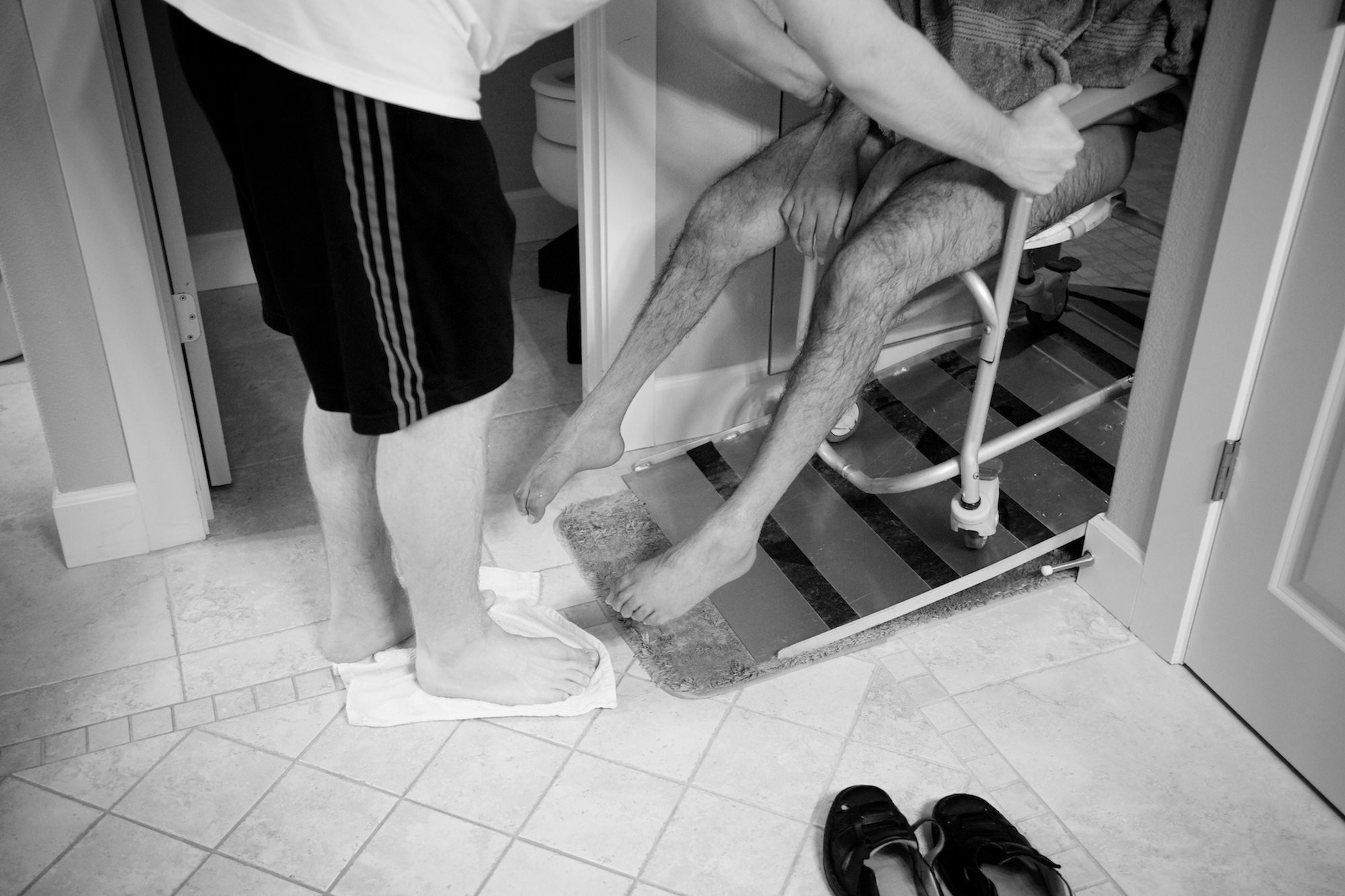
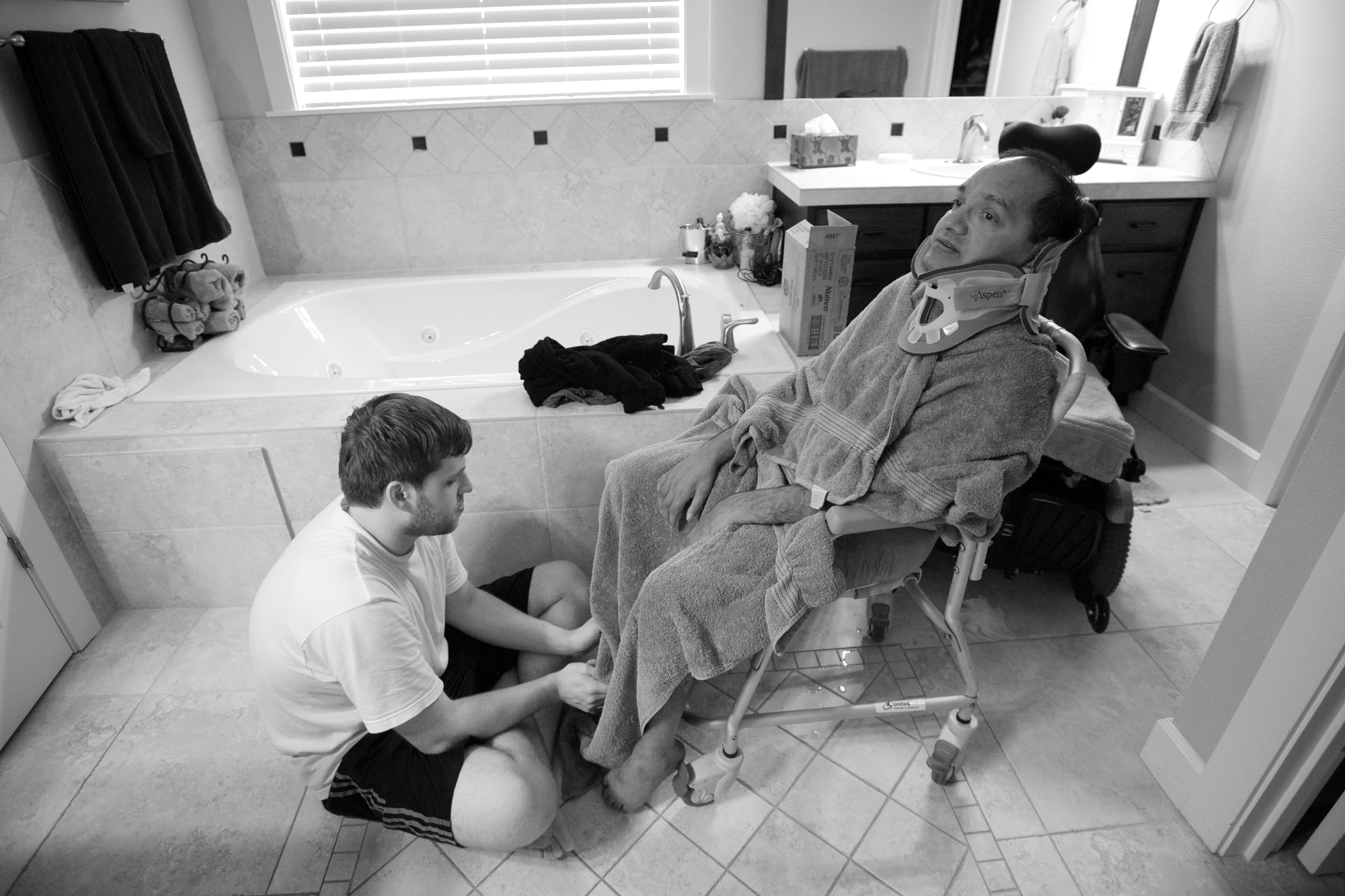
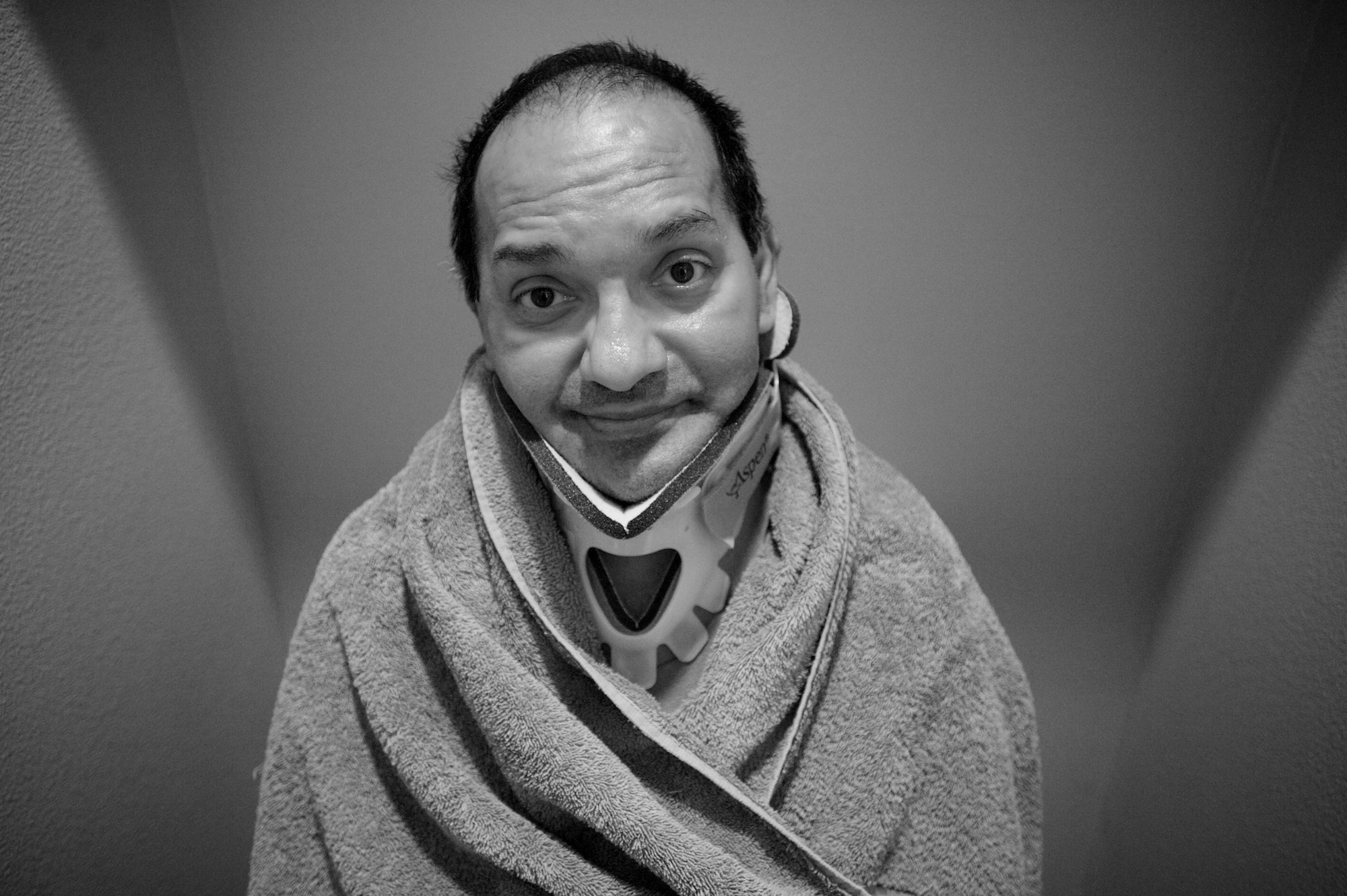
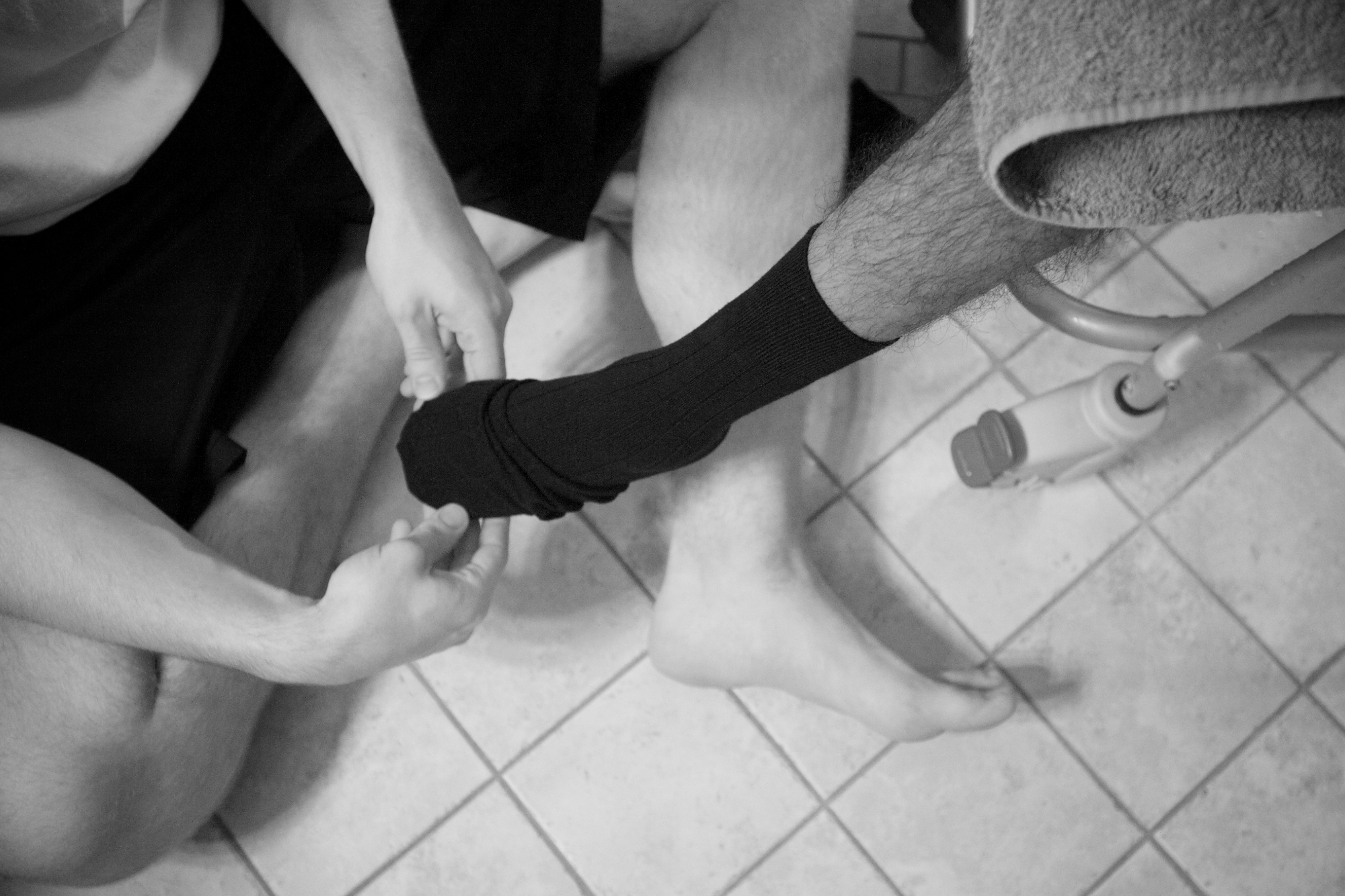
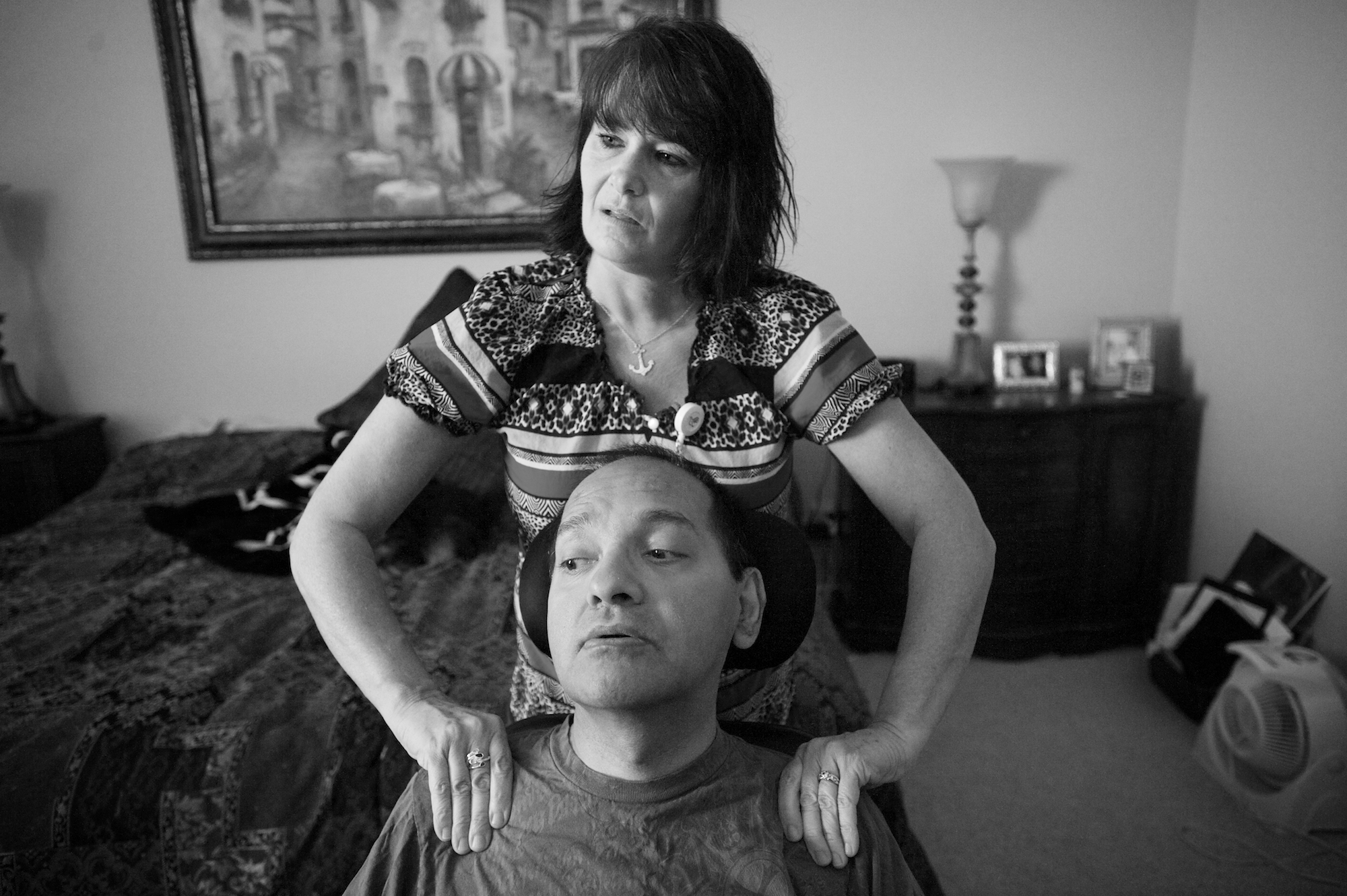
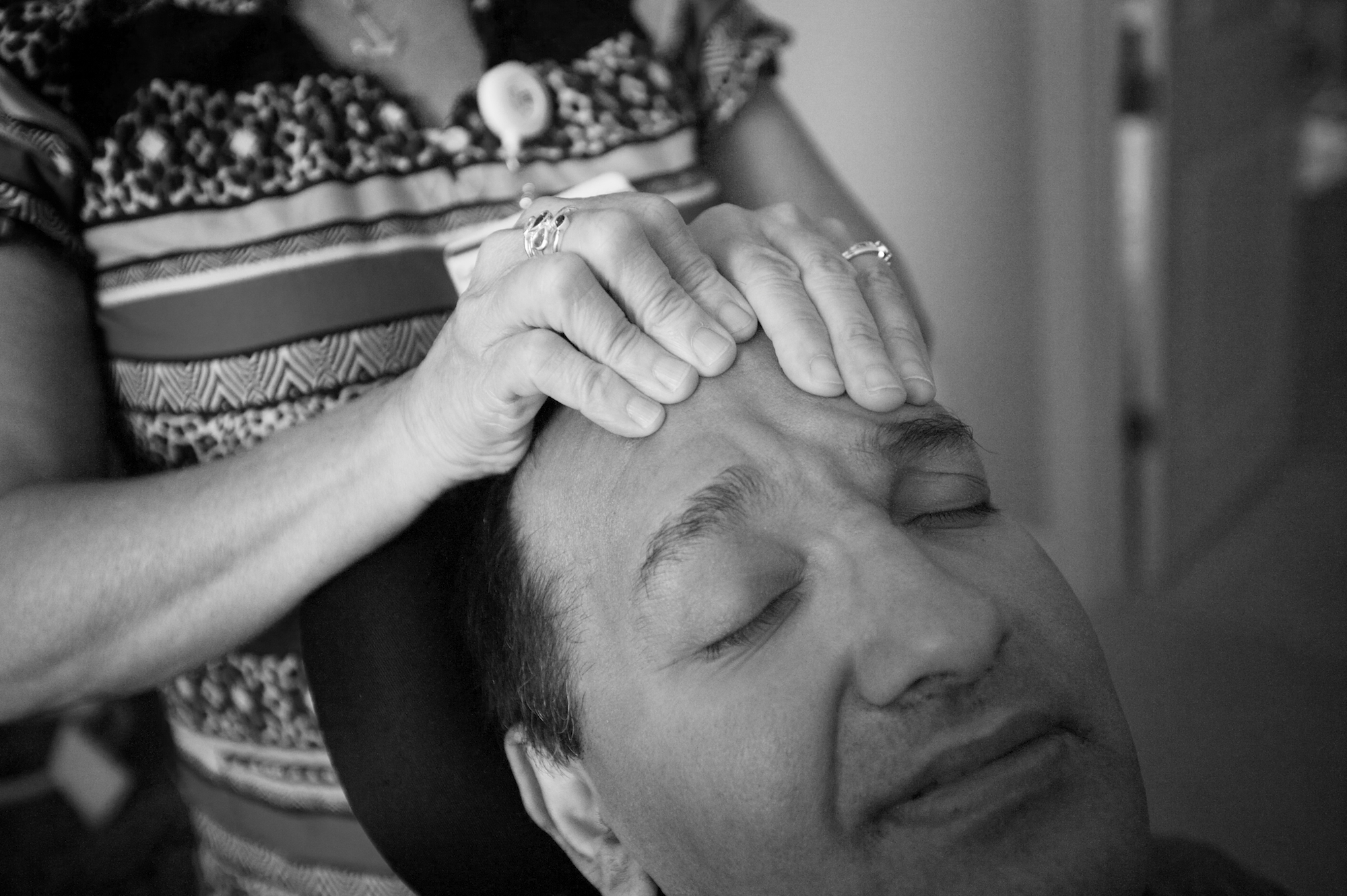
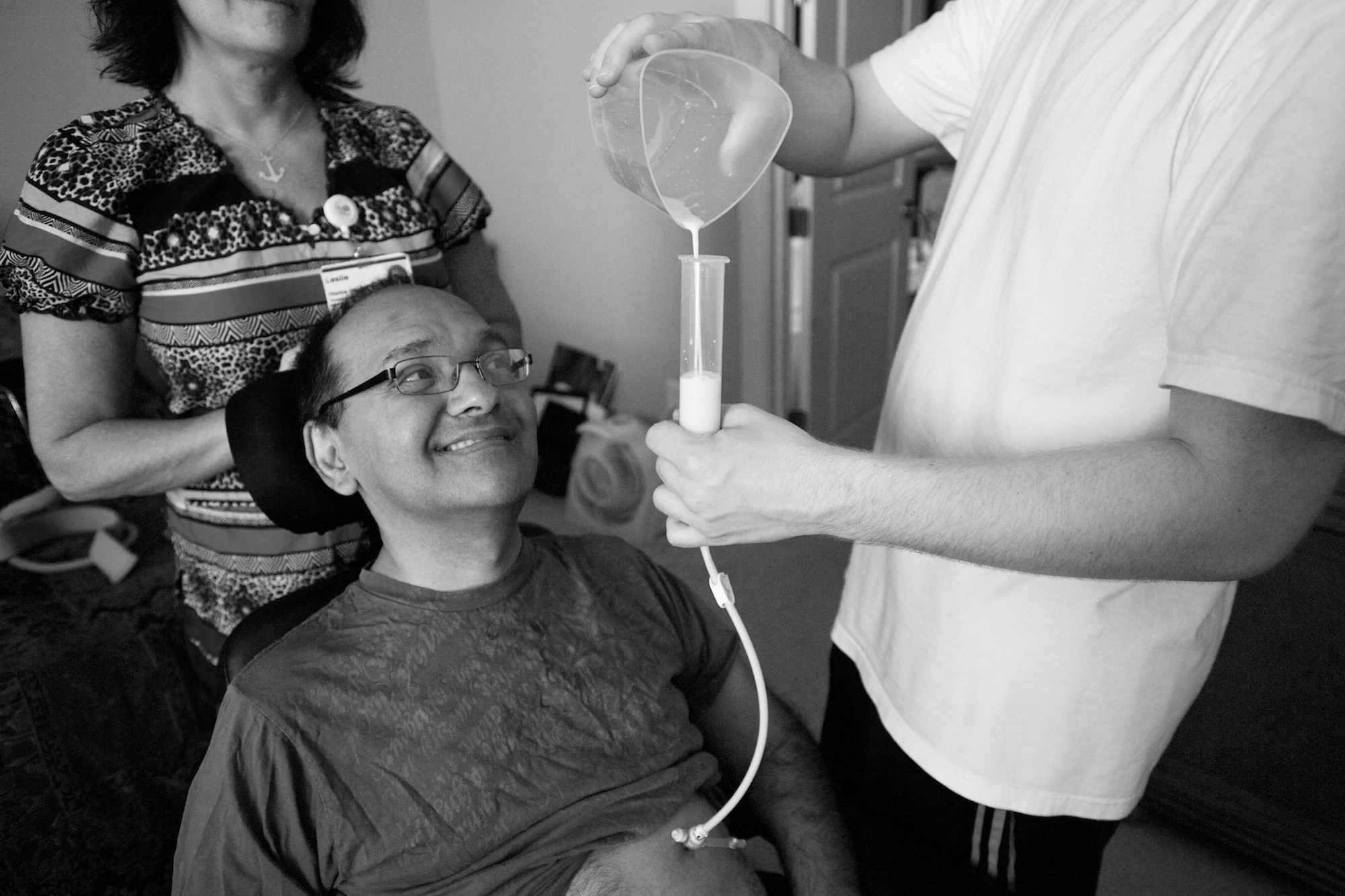
“When I am given a formula, I feel like I am being violated,” Akhil wrote on his blog. “I know I need the calories, but what is the point of all this?”
After the liquid breakfast, Russell moves to the side of the bed and begins to stretch Akhil’s atrophied muscles. Russell pulls Akhil’s arms out straight, then up, then bends them at the elbow — performing the motions people do themselves hundreds of times each day.
Next, he moves to Akhil’s legs, manipulating them into various positions, and then to his feet. Russell gently unfurls each of Akhil’s toes, stretching the tightened tendons.
The routine, Akhil says, is boring.
After they finish the morning stretches, Russell moves Akhil to his wheelchair and maneuvers the chair into the bathroom. A small ramp leads Akhil into the tiled shower, where Russell brushes and flosses Akhil’s teeth. He turns on the water and meticulously washes Akhil’s face, hair and body. When they’re done, Russell dries Akhil’s body from head to toe.
Dressing Akhil is a full-body workout, even though Akhil is just 5 feet, 4 inches and weighs only 135 pounds. Russell shifts Akhil into various positions in his wheelchair as he negotiates pants and a shirt. He pulls socks onto Akhil’s feet and tries to keep the toes straight while working shoes onto his feet.
Then comes one of Akhil’s least favorite parts of the morning.
Russell fastens a vest around Akhil’s chest. The vest inflates and begins shaking Akhil’s upper body at various speeds and pulses, loosening the mucus that’s accumulated in his lungs over night.
After a few minutes, Russell uses a suction machine like those used at dental offices to clear the fluid from Akhil’s throat and mouth.
“I can imagine this must be similar to what water-boarding feels like,” Akhil wrote on his blog.
Such life-sustaining measures continue throughout the day, becoming the new normal for Akhil and the Jhaveri family.
‘Glued together’
Everyone in the Jhaveri family has their own way of coping with the stark reality of Akhil’s terminal illness.
For Akhil and Laura, their faith provides solace.
“I question how people could cope without some sort of faith,” Laura said.
Both Laura and Akhil find comfort in God’s promise to never abandon them, in their belief that God has a purpose in everything.
While relaxing one evening with Akhil, Laura recalled a conversation with their youngest daughter, Jordan, 15.
Jordan could tell Akhil was feeling down and asked Laura what was bothering him. Laura was honest. She told Jordan that Akhil was wondering why God hadn’t healed him.
Jordan’s response brought tears to Laura’s eyes.
Before, we were just taped together. Now, we’re glued together. Jordan Jhaveri
“Well, God hasn’t healed him, but he healed our family,” Jordan told her mom. “Before, we were just taped together. Now, we’re glued together.”
The family is tighter. They talk more. They laugh together. They treasure the time they have.
Perhaps, that’s part of the greater purpose for this diagnosis, Laura reasons. But that doesn’t mean she doesn’t struggle with the reality.
“I can’t say I’m angry with God for allowing the illness,” Laura said. “But I am angry about the life I’m being trapped in. It’s not what I planned for my life.”
The illness has stolen the memories Laura envisioned for herself and Akhil. Driving their daughters to college. Helping them set up their dorm rooms. Going out to dinner afterward to celebrate.
“I’m angry we’re missing that,” she said.
Instead, Laura drove their oldest daughters, Ashley and Corinne, to their respective colleges alone.
“The toughest part of this journey is the pain felt by my family, especially my children and my wife,” Akhil said. “This journey has robbed all of us.”
Coping methods
For 22-year-old Ashley, the diagnosis has had a different impact on her faith.
After high school, Ashley decided to go on a mission trip. She hoped to get centered. But she returned with a new perspective about religion.
“I decided I didn’t want to be Christian anymore,” she said.
“Faith has been a hard thing for me,” she explained. “Because, why is this happening to my dad? He’s such a good dude.
“In order to cope with all the anger I had, I just left it.”
Instead, Ashley focuses on the present. When she’s at away at Eastern Washington University, she focuses on her coursework and being a college student. She pushes aside the emotion, only occasionally allowing it to surface.
“I just feel it and be sad,” Ashley said. “I just save up all the sadness for one time and get it out.”
Enlarge

Ariane Kunze
Corinne, 20, copes in a similar way.
“I try to put it out of my mind as much as possible,” she said. “I almost feel like I have an easy way because I’m at school.”
Corinne, a student at Western Washington University, hasn’t told many people about her dad. Even some of her best friends, people she spends most of her time with in Bellingham, don’t know.
“I don’t like to talk to people about it,” she said.
For the first several years, Jordan, 15, didn’t tell anybody about her dad’s condition, either. Even in the years after Akhil stopped working, Jordan continued to act as if nothing had changed.
By the end of her eighth-grade year, a couple of Jordan’s close friends began asking more questions. Finally, she told them about her dad — his diagnosis, his declining health, his prognosis.
Those are the people she turns to now when she needs to talk about her dad. When she sees her sisters, they don’t talk about the disease.
They say they don’t need to; they live with it every day.
“It’s hard, and it’s uncomfortable,” Jordan said.
Passing dark thoughts
Reality — and the future — can be difficult for Akhil to think about, too.
“I think about dying and, worse, I think about living for years like this,” he said.
That, he said, is when his faith is challenged the most.
When Akhil got sick last December, doctors told him he had only days to live. Fluid in his lungs was making breathing difficult. He was suffering. He was tired of fighting.
In those hours, Akhil considered the Death with Dignity Act, which allows terminally ill adults to request life-ending medication from a medical provider. But he realized he couldn’t take his own life.
God. He saved me in December, so he must have something in mind. Akhil Jhaveri
“I’m the father to three daughters and they are going to have a hard time in the future,” he said. “I don’t want to give them a license to commit suicide or quit.”
But, Akhil said, he had another reason not to take his own life.
“God,” he said. “He saved me in December, so he must have something in mind.”
“I don’t want to ruin the surprise,” he added. “I’m going to wait it out.”
RELATED STORY
ALS diagnosis an ‘emotional shock’ for families
Local expert says it often has unexpected consequence of strengthening bonds, human spirit
Akhil Jhaveri was 45 years old when he received a life-changing diagnosis. In July 2011, Akhil learned he has ALS.
ALS, or amyotrophic lateral sclerosis, is a progressive neurodegenerative disease that affects nerve cells in the brain and spinal cord. There is no known cause or cure. For most people, the disease is fatal within two to four years of the diagnosis.
ALS, also known as Lou Gehrig’s disease, slowly robs people of their ability to walk, move their arms, speak, swallow and breathe. In most cases, the terminal aspect of ALS is tied to respiratory issues, said Lance Christian, executive director of the ALS Association Oregon and S.W. Washington Chapter.
ALS is slightly more common among men than women, and the average age of diagnosis is 55, Christian said. The rate at which the disease progresses, however, varies from person to person.
“ALS is not a cookie-cutter disease,” he said.
An estimated 30,000 people are living with ALS at any given time in the U.S. The disease is diagnosed at the same rate as multiple sclerosis, but because the disease is terminal, the population of people living with ALS is smaller than those with MS, Christian said.
At any given time, the local ALS chapter is working with about 40 families living with ALS in Southwest Washington, Christian said. The organization aims to support not only those living with ALS, but their families and caregivers as well.
“It’s an emotional shock for the entire family,” Christian said of an ALS diagnosis. “We believe that not just the person with the diagnosis has ALS, but the whole family has ALS.”
An ALS diagnosis impacts families in a variety of ways, Christian said. Families often face changing roles — children or spouses may become caregivers, for example — financial stresses, dramatically increasing medical costs and existential issues, leading family members to question the meaning of their lives and the diagnosis, he said.
All the while, other parts of the family members’ lives continue. Kids go to school or go away to college, leaving the healthy spouse to be pulled in many different directions, Christian said.
Still, he said, families often come together during the tough times and move forward together.
“ALS has come into their life and turned their lives upside down, but they’ll say things like, ‘This disease is a blessing,’ ” Christian said. “That’s always flooring to me and anyone else not living the experience.”
Friends, family members and caregivers all step up, Christian said, and beautiful new relationships form. He often hears families express gratitude for those connections, despite the circumstances under which they came about.
“I think it speaks to the human spirit,” Christian said. “In the depths of really difficult things, there are positives. People live life and still have gratitude and hope.”
Marissa Harshman: 360-735-4546; marissa.harshman@columbian.com; twitter.com/MarissaHarshman